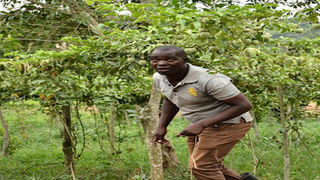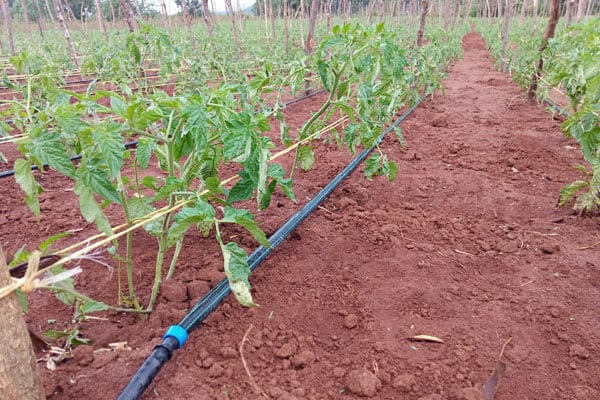
James Mulwana's passion for mixed farming was a game changer. PHOTO/GEORGE KATONGOLE
|How Mulwana followed his farming passion
What you need to know:
- James Charles Mulwana is a first-generation farmer running a 10-acre farm in Mukono District near the former Namyoya Forest Reserve.
- He has been a sustainable organic farming trainer.
- He is on a journey to empower farmers in his area using the vast knowledge he has acquired over the years.
James Mulwana is a progressive farmer, who had been stuck in the employment cycle until he broke the yoke in 2020 to establish a farm on land he had bought more than 10 years ago.
Mulwana, who farms on 10 acres of land in Nalubabwe village, Nabaale Sub-county, in Nakifuma, Mukono District, got his turning point when he lost six dairy cows he had left in the custody of workers and realised he had to be closer to his business.
The 40-year-old father of seven, who was born in Kikandwa, Kayunga District, owns a passion fruit orchard on about one acre, tomatoes of varying age on one and a half acres, tree nursery, paw-paw trees at the edge of your garden and a eucalyptus farm.
His dream is to become a model farmer with specialisation in fruit growing. Apart from the sheer joy of picking fresh fruit and cash, Mulwana explains that fruits take long while harvesting them.
From employment
Mulwana says he was so much taken up by the thrill of employment. Before 2019, he was farming just for passion.
Having worked with Send-a-Cow as a peer farmer in the village model, he was employed by Riverside Farm Kasenge from 2008 before working for General Katumba Wamala in Mukono as a farm manager until 2019.
“I always looked at the monthly salary as a big thing. I had not known that I had to create my own legacy amidst the challenges,” Mulwana says.
An opportunity came to Mulwana in 2009 when he was invited to the UK by John Watson, the owner of Riverside Organic Farm in Norwich, for a training on organic farming. But he admits that his initial thought was getting additional money from UK to improve his life. Yet he was wrong.
“I was disappointed when I reached UK. John asked about my expectations. I told him that I was looking for money to help me buy land for my own farm. He laughed off my idea and told me not to expect any money from him,” Mulwana recalls. It was a depressing moment for him since his expectations were watered down.
After the meeting, Mulwana recalls, John gave him and his son, Guy Singh-Watson, a farming book.
On the second invitation after six months, Watson asked Mulwana about what he had read from the book. Surprisingly, he had never opened it yet Guy had established an organic farm in France.
“I felt so small and wondered what was in the book,” he says.
But this time he was allowed to do some petty work after the training. When he returned home, he read the book and discovered great nuggets of farming information in Africa. This is the time he bought 10 acres in Nakifuma where he currently farms.

Paw-paws provide Mulwana with diverse sources of income on the farm. PHOTO/GEORGE KATONGOLE
But Mulwana was not done yet with seeking work. He approached Timothy Njakasi of Kasenge Riverford Organic Centre in Mukono District, a former supervisor at Send-a-Cow for work. He was put in charge of training farmers at the centre while working as an agronomist mainly overseeing the greenhouse operations.
It was from here that in 2015 Gen. Katumba Wamala asked for his services on the greenhouse operations. It was initially a week’s gig yet it lasted until 2019. Mulwana explains that he improved the performance of the greenhouse but discovered that the cost of production was very high.
“I advised Gen Katumba to consider his options and revise the operations of the greenhouse,” he says.
This is when he was involved in the piggery project, Kuroiler chicken and other crop farm operations as the farm manager until he retired in December 2020.
On his own
But this was a great learning period which helped him set his strategies.
“I realised first-hand the challenges of piggery especially diseases such as Swine Fever and from that time on I decided to involve myself into fruit farming,” Mulwana says.
Another great piece of knowledge he had gained was on book-keeping. As a supervisor, he was supposed to keep the records clean on issues such as stock, diseases and expenditures. He now realises that a successful farm operation requires proper record keeping.
Moving to Nakifuma in January 2021, Mulwana ploughed his land and grew tomatoes mixed with passion fruits during the first season. He says his first harvest was promising and earned well from the tomatoes. He re-invested the money in expanding the farm. Mulwana rented land in the valley where he ensures a steady supply of tomatoes with more access to water.

Mulwana in his tomato garden. He expects to start harvesting in about five weeks.
As a progressive farmer, Mulwana uses casual labourers. But during the Covid-19 lockdown, he used family labour of his three children.
Marketing
One of the biggest hurdles of farming among smallholder farmers is marketing. But in tomato growing, he says the market was flooded during the lockdown as a result of many people that entered the business.
He says that at a certain time farmers sold a box of tomatoes [about140kg] at Shs500,000 but kept declining until it was sold at Shs30,000 from July until December last year. Buyers normally come to the garden which limits the farmers’ potential to negotiate for better prices. His vision is to organise fellow farmers and be able to add value by processing them into paste.
“We made a lot of losses during the lockdown which made me realise that value addition can save farmers from incurring losses,” Mulwana says.
He adds that as survival tactic, he has decided to diversify into other enterprises such that losses can be compensated by profits elsewhere.
The major hurdle is the lack of access to information regarding agricultural financial facilities especially by the government through Bank of Uganda, Uganda Development Bank as well as Emyooga and other development partners such as aBi. These bodies have financial solutions that help farmers through the production stage to marketing of produce. But Mulwana explains that as farmers in the area, have not been educated by banks on their services. He adds that most farmers are still afraid to approach banking institutions for fear of losing their land in case of losses.
As a well-travelled farmer, he plans to create a farmers’ group in Nalubabwe for collective marketing opportunities.
In the future, he plans to venture into dairy farming to make his farm more self-reliant.
Mulwana’s tips
He says that a farm needs someone’s availability. He says that when you delegate most of the work, it is highly possible to make losses.
Mulwana adds that even though at first one enters the business because of passion, they must seek the enterprises that can be profitable. He says that farming pays off after some time.
He explains that a farmer should consider the cost of production including such issues as land, inputs such as seed, fertiliser, labour and storage.




